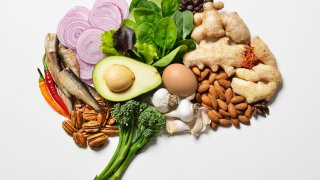
What you eat can, and does, impact the function of your brain, including your ability to ward off Alzheimer's disease and there are certain foods — like sunflower seeds and whole grains — that provide greater benefits.
There is one food in particular that Dr. Uma Naidoo, a Harvard nutritionist, and Lisa Genova, a Harvard-trained neuroscientist, say is the key to a healthy brain: Green leafy vegetables.
The No. 1 food for a healthy brain: Green leafy vegetables
Get Boston local news, weather forecasts, lifestyle and entertainment stories to your inbox. Sign up for NBC Boston’s newsletters.
Across the board, experts agree that eating leafy greens is essential for overall health, especially for your brain.
Some of the green leafy vegetables that you can add to your meals are:
- Kale
- Spinach
- Lettuces
- Cabbage
- Swiss chard
- Bok choy
- Mustard greens
3 reasons experts say a diet rich in leafy greens is good for your brain
Money Report
1. They're rich in B vitamins
Often, conditions like depression and dementia are associated with a vitamin B deficiency, according to a study from the Wayne State University School of Medicine.
Green leafy vegetables are a wonderful source of vitamin B9, Naidoo told CNBC Make It in 2022. The vitamin, also known as folate, is "a key vitamin for supporting brain and neurological health, optimal neurotransmitter function, and balanced psychological health," she added.
Leafy greens are the first type of food that Naidoo suggests for her patients who are looking to boost their mood.
2. They're high in brain-boosting nutrients
Green leafy vegetables are also full of what Genova calls "brain-boosting nutrients" including folate, lutein and beta-carotene.
Lutein has been linked to an improvement in brain function and brain structure for older adults. And a systematic review found that taking beta-carotene supplements can boost "verbal and cognitive memory."
3. They're full of fiber
Increasing intake of dietary fiber was associated with a lower chance of developing depression, a study published in "Complementary Therapies in Medicine" in 2021 found.
Naidoo prefers to recommend getting more fiber through your diet, specifically plant-based foods. And leafy greens just so happen to be fiber-dense.
Want to make extra money outside of your day job? Sign up for CNBC's new online course How to Earn Passive Income Online to learn about common passive income streams, tips to get started and real-life success stories. Register today and save 50% with discount code EARLYBIRD.
Plus, sign up for CNBC Make It's newsletter to get tips and tricks for success at work, with money and in life.






